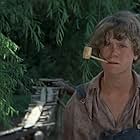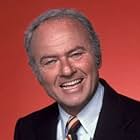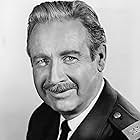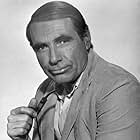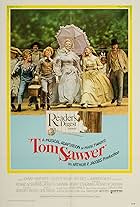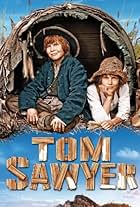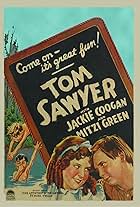In 1840s Missouri, young Huckleberry Finn, wanting to escape his violent drunkard father, joins Black runaway slave Jim on a quest for freedom down the Mississippi River on a raft.In 1840s Missouri, young Huckleberry Finn, wanting to escape his violent drunkard father, joins Black runaway slave Jim on a quest for freedom down the Mississippi River on a raft.In 1840s Missouri, young Huckleberry Finn, wanting to escape his violent drunkard father, joins Black runaway slave Jim on a quest for freedom down the Mississippi River on a raft.
- Director
- Writers
- All cast & crew
- Production, box office & more at IMDbPro
Storyline
Did you know
- TriviaThis was the first musicalization of Huckleberry Finn. The next one happened 10 years later in 1985, on Broadway; it was "Big River." a hit show which ran for several years and won seven Tonys, including Best Musical.
- Quotes
Huckleberry Finn: I don't give a damn what the whole world says, 'cause if I'm doin' wrong--well--well, I hope I roast in hell forever.
- ConnectionsFollows Tom Sawyer (1973)
Featured review
A forgotten relic from the early '70s, when shows like "Little House on the Prairie" and "The Waltons" all reflected our yearning for a so-called simpler, less complicated era. This adaptation, while not entirely faithful to the book, captures its essential themes and spirit rather well. There are some technical problems (the lighting always seem to be half in shadow, whether it's night or day!) and its kiddie-friendly tone seems at odds during the Grangerfords/Shepherdsons sequence, wherein we see men being shot and killed right on camera--and it's handled rather lightly. Parents should also be warned that this adaptation does have some strong language--it has not been sanitized, notwithstanding its G rating.
In addition, the musical format sits much more uneasily with this movie than with the superior "Tom Sawyer" (from the year before, with many of the same cast members and production staff). However, as oddly as some numbers come off, others are wonderful, such as the clever, dixie-ish "Cairo, Illinois," a duet between Huck and Jim that kicks off their great journey together. The jaunty title song and the lovely anthem "Freedom" also showcase the movie and its themes beautifully--especially during "Freedom"'s reprise, as Huck, the boy/man run away, gazes after Jim making his way downriver. Performances are generally strong--Jeff East could've been a better singer but his performance is so sincere and authentic, you hardly notice. Likewise his bond with Jim (well-portrayed by the late Paul Winfield) comes through nicely, most especially in their final, very moving scene together. Harvey Korman and David Wayne also deliver terrific turns as the King and the Duke, respectively.
Cinematography is *gorgeous*--the DP took full advantage of the location shoot, with some beautiful silhouette shots. Although its prequel is far better (you simply cannot top "Tom Sawyer"'s terrific score and thoroughbred cast), Mark Twain's quintessential Great American novel is reasonably well-served here, if not transcendently.
In addition, the musical format sits much more uneasily with this movie than with the superior "Tom Sawyer" (from the year before, with many of the same cast members and production staff). However, as oddly as some numbers come off, others are wonderful, such as the clever, dixie-ish "Cairo, Illinois," a duet between Huck and Jim that kicks off their great journey together. The jaunty title song and the lovely anthem "Freedom" also showcase the movie and its themes beautifully--especially during "Freedom"'s reprise, as Huck, the boy/man run away, gazes after Jim making his way downriver. Performances are generally strong--Jeff East could've been a better singer but his performance is so sincere and authentic, you hardly notice. Likewise his bond with Jim (well-portrayed by the late Paul Winfield) comes through nicely, most especially in their final, very moving scene together. Harvey Korman and David Wayne also deliver terrific turns as the King and the Duke, respectively.
Cinematography is *gorgeous*--the DP took full advantage of the location shoot, with some beautiful silhouette shots. Although its prequel is far better (you simply cannot top "Tom Sawyer"'s terrific score and thoroughbred cast), Mark Twain's quintessential Great American novel is reasonably well-served here, if not transcendently.
- How long is Huckleberry Finn?Powered by Alexa
Details
- Release date
- Country of origin
- Official site
- Language
- Also known as
- Mark Twain's Huckleberry Finn: A Musical Adaptation
- Filming locations
- Production companies
- See more company credits at IMDbPro
Box office
- Budget
- $3,000,000 (estimated)
- Runtime1 hour 58 minutes
- Color
- Aspect ratio
- 2.35 : 1
Contribute to this page
Suggest an edit or add missing content









